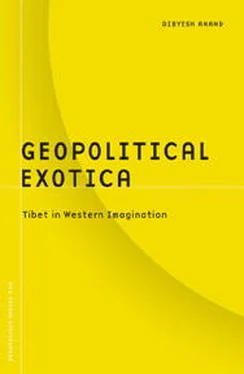Tololyan, K. 1991. "The Nation-State and its Others: In Lieu of a Preface." Diaspora 1, no. 1: 3-7.
– -. 1996. "Rethinking Diaspora(s): Stateless Power in the Transnational Moment." Diaspora 5, no. 1: 3-36.
TPPRC (Tibetan Parliamentary and Policy Research Center). 2000. The Case concerning Tibet: Tibet's Sovereignty and the Tibetan People's Right to Self-Determination. 2nd ed. New Delhi: TPPRC.
Trungpa, Chogyam. 1995. Shambhala: The Sacred Path of the Warrior. Ed. C. R. Gimian. Boston: Shambhala.
Tsarong, P. 1992. "Understanding Decolonization and Its Implications for the Tibetan Movement." Tibetan Review (November): 14-19.
Tsering, L. 1998. "The Issue Is Independence." In Tibet: The Issue Is Independence, ed. E. Lazar. Delhi: Full Circle.
Turner, S. 1971. An Account of an Embassy to the Court of the Teshoo Lama in Tibet, 1800. New Delhi: Manjushri.
Tuttle, G. 2005. Tibetan Buddhists in the Making of Modern China. New York: Columbia University Press.
Uncovered Editions. 1999. The British Invasion of Tibet: Colonel Younghusband, 1904. London: The Stationary Office.
Van Maanen, J., ed. 1995. Representation in Ethnography. London: Sage.
Venturino, S. 1992. "Reading Negotiations in the Tibetan Diaspora." In Constructing Tibetan Culture: Contemporary Perspectives, ed. F. J. Korom. Quebec: Heritage Press.
Vertovec, S. 1992. "Three Meanings of 'Diaspora' Exemplified among South Asian Religions." Diaspora 6, no. 3: 277-300.
Waddell, L. A. 1905. Lhasa and Its Mysteries: With a Record of the Expedition of 1903-1904. London: John Murray.
____________________. 1972 [1905]. Tibetan Buddhism with Its Mystic Cults, Symbolism,
and Mythology. New York: Dover Publications.
Waever, O. 1998. "The Sociology of a Not So International Discipline: American and European Developments in International Relations." International Organization 52, no. 4: 687-727.
Walker, J. T. 1885. Four Years' Journeyings through Great Tibet by One of the Trans-Himalayan Explorers of the Survey of India. London: Wm. Clowes and Sons.
Walker, R. B. J. 1990. "Sovereignty, Identity, Community: Reflections on the Horizons of Contemporary Political Practice." In Contending Sovereignties: Redefining Political Community, ed. R. B. J. Walker and S. H. Mendlovitz. Boulder, Colo: Lynne Rienner.
____________________. 1993. Inside/Outside: International Relations as Political Theory.
Cambridge: Cambridge University Press.
____________________. 1995. "From International Politics to World Politics." In The State
in Transition: Reimagining Political Space, ed. J. A. Camilleri, A. P. Jarvis, and A. J. Paolini. Boulder, Colo.: Lynne Rienner.
Waller, D. 1990. The Pundits: British Exploration of Tibet and Central Asia. Lexington: University Press of Kentucky.
Walt van Praag, M. C. 1987. The Status of Tibet: History, Rights, and Prospects in International Law. London: Wisdom.
Wang Jiawei, and Nyima Gyaincain, eds. 1992. The Historical Status of China's Tibet. Beijing: China Intercontinental Press. Available at http://www.tibet-china.org/historical_status/english/(accessed 15 August 2006).
Wang Lixiong. 2002. "Reflections on Tibet." Translated by Liu Xiaohong and A. T. Grunfeld. New Left Review 14 (March-April): 79-111.
Ward, F. K. 1934. A Plant Hunter in Tibet. London: Jonathan Cape.
Weber, C. 1995. Simulating Sovereignty: Intervention, the State, and Symbolic Exchange. Cambridge: Cambridge University Press.
____________________. 1999. "IR: The Resurrection or New Frontier of Incorporation."
European Journal of International Relations 5, no. 4: 435-50.
Wei Jingsheng. 1998. "A Letter to Deng Xiaoping." In Tibet through Dissident Chinese Eyes: Essays on Self-Determination, ed. Cao Changching and J. D. Seymour. New York: M. E. Sharpe.
Weldes, J. 1999. Constructing National Interests: The United States and the Cuban Missile Crisis. Minneapolis: University of Minnesota Press.
Weldes, J., M. Laffey, H. Gusterson, and R. Duvall, eds. 1999. Cultures of Insecurity: States, Communities, and the Production of Danger. Minneapolis: University of Minnesota Press.
Wellby, M. S. 1898. Through Unknown Tibet. London: T. Fisher Unwin.
Wiggins, L. R. 1994. "Sino-Tibetan Relations and Tributary Ideology." Tibet Journal 25, no. 1: 63-73.
Wilby, S. 1988. Journey across Tibet: A Young Woman's 1900-Mile Trek across the Rooftop of the World. Chicago: Contemporary Books.
Williams, P., and P. Childs. 1992. An Introduction to Post-Colonial Theory. London: Prentice Hall, Harvester Wheatsheaf.
Willoughby, M. E. 1924. "The Relation of Tibet to China." Journal of the Central Asian Society 11, no. 3: 187-203.
Wilson, A. 1987. "Kipling's Kim." In Modern Critical Interpretations: Rudyard Kipling's "Kim," ed. H. Bloom. New York: Chelsea House.
Wood, R. E. 1998. "Touristic Ethnicity: A Brief Itinerary." Ethnic and Racial Studies 21, no. 2: 218-41.
Woodcock, G. 1971. Into Tibet: The Early British Explorers. London: Faber and Faber.
World Tibet News. 1999. "Murdoch Brands Dalai Lama a 'Monk in Gucci Shoes,'" 7 September. Available at http://www.tibet.ca/en/wtnarchive/ 1999/9/7_5.html(accessed 20 August 2006).
____________________. 1998. "Clinton Urges China to Talk to Dalai Lama," 27 June.
Available at http://www.tibet.ca/en/wtnarchive/1998/fi/19_2.html(accessed 20 August 2006).
Xu Guangui. 1992. "The United States and the Tibet Issue." Asian Survey 37, no. 11: 1062-77.
Xu Mingxu. 2000. "Tibet Question: A New Cold War." Paper Presented at the 18th World Congress of the International Political Science Association, August, Quebec City.
Yegenoglu, M. 1998. Colonial Fantasies: Towards a Feminist Reading of Orientalism. Cambridge: Cambridge University Press.
Young, R. 1990. White Mythologies-Writing History and the West. London: Routledge.
Younghusband, F. 1910. India and Tibet: A History of the Relations Which Have Subsisted between the Two Countries from the Time of Warren Hastings to 1910; With a Particular Account of the Mission to Lhasa of 1904. London: John Murray.
Yue, Gang. 2004. "Echoes from the Himalaya: The Quest of Ma Lihua, a Chinese Intellectual in Tibet." Journal of Contemporary China 13, no. 38: 69-88.
Zheng Shan, ed. 2001. A History of Development of Tibet. Trans. Chen
Guansheng and Li Peizhu. Beijing: Foreign Language Press. Zizek, S. 2001. On Belief. London: Routledge.
Kundun (video recording). 1992. Walt Disney Video. Directed by M. Scorsese, produced by B. de Fina.
Lost Horizon (DVD). 1937. Directed and produced by Frank Capra.
Seven Years in Tibet (video recording). 1992. Tristar Pictures and Madalay Entertainment. USA. Directed by Jean-Jacques Annaud, produced by Jean-Jacques Annaud, I. Smith, and J. H. Williams.
The Face of Fu Manchu (video recording). 1965. UK. Directed by D. Sharp.
Chapter 2 was published in New Political Science. Copyright 2007 Taylor and Francis. Reprinted with permission. New Political Science is available online at http://journalsonline.tandf.co.uk.
A portion of chapter 3 was published as "Archive and the Poetics of 'Exotica Tibet,'" in Tibetan Borderlands: Proceedings of the Tenth Seminar of the IATS, 2003, ed. P. C. Klieger (Leiden: Brill Academic Publishers, 2006). Reprinted with permission.
Chapter 4 is adapted from "The Tibet Question and the West: Issues of Sovereignty, Identity, and Representation," in Contemporary Tibet: Politics, Development, and Society in a Disputed Region, ed. Barry Sautman and June Teufel Dreyer (Armonk, N.Y.: M. E. Sharpe, 2006). Reprinted with permission.
Chapter 4 draws on "A Story to Be Told: IR, Postcolonialism, and the Tibetan (Trans)Nationalism," in Power, Postcolonialism, and International Relations: Reading Race, Gender, and Class, ed. G. Chowdhry and S. Nair (London: Routledge, 2002). Reprinted with permission.
Читать дальше












